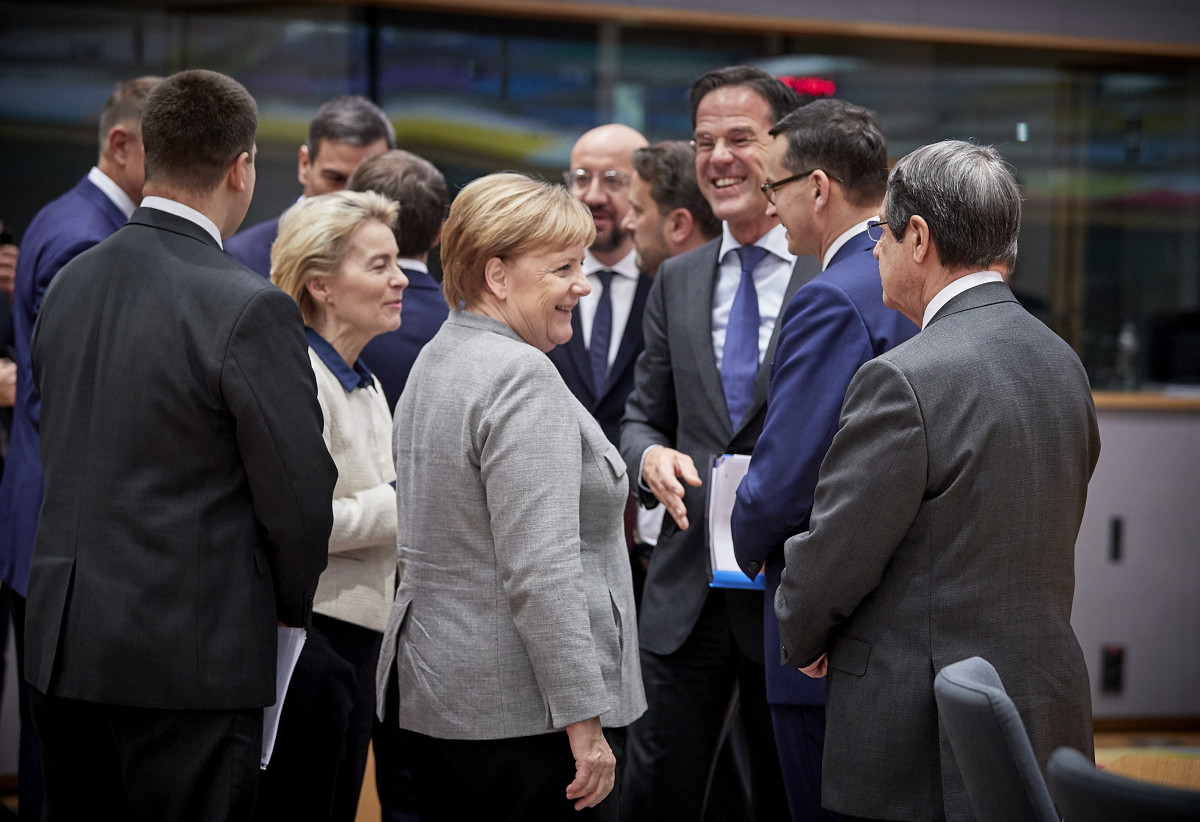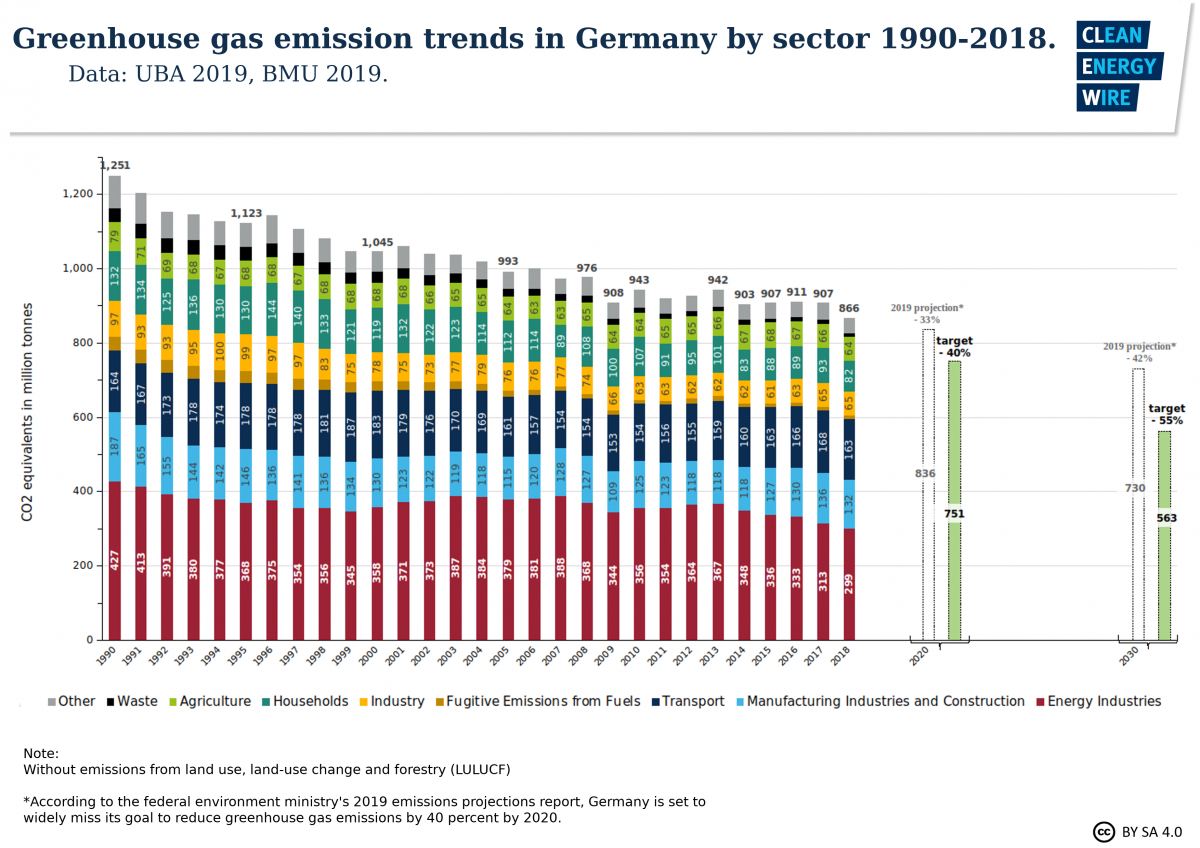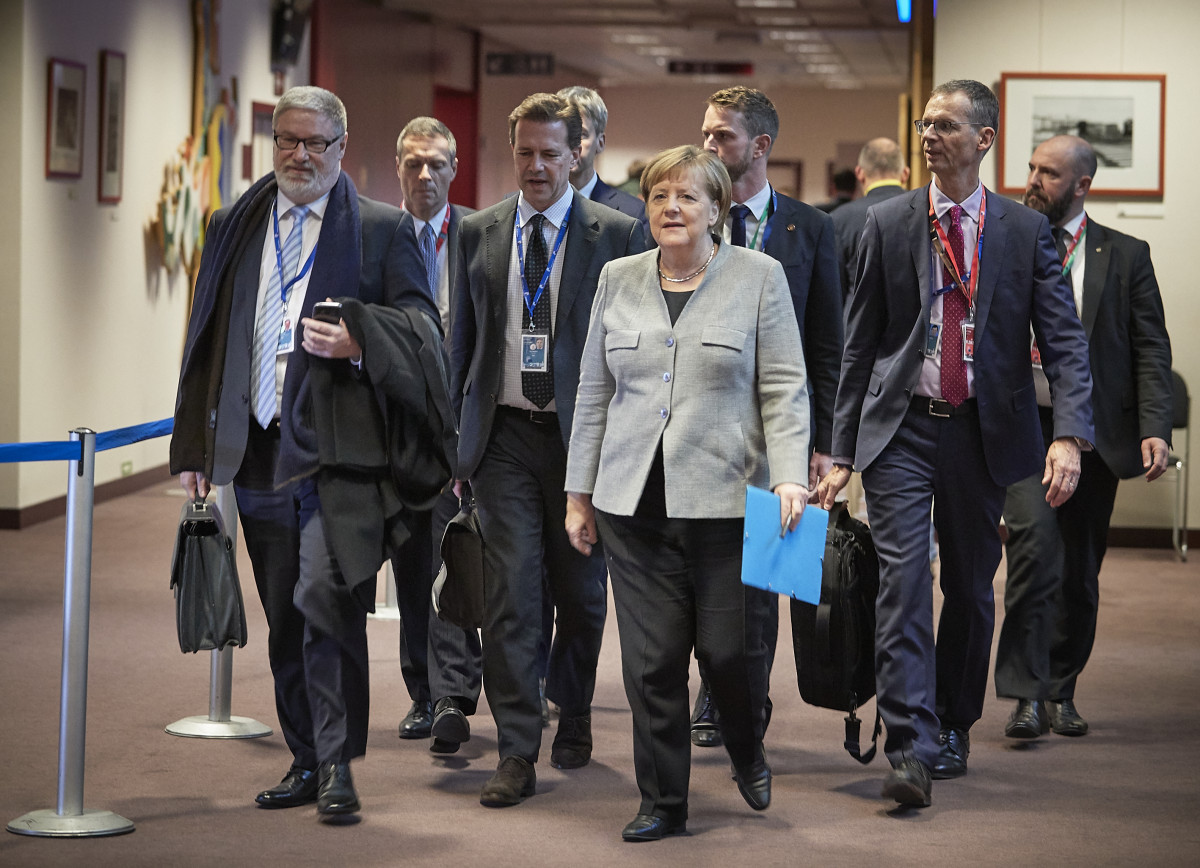EU and Germany hold pivotal role to drive global climate ambition 2020
2020 is going to be a difficult year for international climate diplomats after what many saw as a disappointing outcome at the UN climate conference, COP25, in Madrid. In this environment, analysts say the European Union and Germany will play an important role in getting efforts to raise global ambition back on track.
“The outcome revealed just how tough the geopolitics of climate ambition will be next year,” said Quentin Genard, acting head of the Brussels office of climate change think tank E3G. The least ambitious countries had been able to slow down the talks and the lack of strong political momentum beyond the EU made it hard to produce an ambitious outcome. “We cannot afford to sleepwalk into COP26. It should be the peak of a year of engagement and announcements,” Genard told Clean Energy Wire.
After the gavel came down in Madrid, UN Secretary-General António Guterres said in a message on Twitter that he was disappointed, “but we must not give up. […] I am more determined than ever to work for 2020 to be the year in which all countries commit to do what science tells us is necessary to reach carbon neutrality in 2050 and a no more than 1.5 degree temperature rise.”
His comments were echoed by German environment minister Svenja Schulze, who said it was “time to look ahead now”, arguing that "those who hit the brakes must not set the course." Europe must lead by example, Schulze added.
To make this happen, Germany will have to do its part, as well. Internationally, the country for many still has the reputation of being a climate leader. It has long tried to establish itself as a hub for the global climate debate with the annual Petersberg Climate Dialogue and the Berlin Energy Transition Dialogue, a leading high-level policymakers and industry conference. In addition, it has made climate a focus of its current two-year seat as a non-permanent member of the United Nations Security Council (UNSC).
However, the “Energiewende” country has struggled with bringing down greenhouse gas emissions enough in all sectors and is set to miss national energy and climate targets next year. And it remains to be seen whether Chancellor Angela Merkel’s fragile government coalition is able to convince policymakers across the globe to do more.
Countries are called upon to increase the ambition of their national climate pledges (NDCs) before the next COP26 in Glasgow in November. With current pledges, the world is heading for a 3.2°C temperature rise, according to the latest UN emissions gap report – far from the ambitious 1.5° target from the Paris Climate Agreement.
While many signatories to the accord have said they would enhance national plans, many major polluters have not. The United States’ withdrawal from the Paris Agreement is set to take effect on the day after the presidential elections and other G20 nations like Saudi Arabia and Brazil are hampering the drive for more climate action.
“In the current challenging geopolitical context, the role of the EU is becoming even more important,” Cleo Verkuijl, research fellow at the Stockholm Environment Institute (SEI), told Clean Energy Wire. “It needs to set the right example by adopting ambitious and equitable climate goals and also ensuring climate action stays on the top op of the agenda internationally.”
New European Commission president Ursula von der Leyen – former German defence minister and close Merkel-ally – has just presented the framework of an ambitious comprehensive economic plan to make the continent climate neutral by 2050 – the European Green Deal.
EU politicians, such as the European Parliament Green group’s Bas Eickhout, agree that people around the globe “will look at Europe”. However, time has to be used effectively, as the bloc will have to step up the ambition of its 2030 target before the end of next year – something that is bound to bring about difficult discussions among member states – and finalise its long-term climate strategy. “We have one year,” said Eickhout at a recent press conference in Brussels.
At their December summit, EU leaders called on the European Commission to present its proposal to enhance the 2030 target “in good time before COP26” and “after a thorough impact assessment”.
Germany will have critical role in finalising EU NDC debate during Council presidency
Many of the relevant discussions could well fall into the second half of 2020, when Germany holds the EU Council presidency – something German EU officials have been preparing for months.
The Council represents the executive governments of member states, and the presidency rotates among EU member states every six months. It is not only responsible for setting policy priorities and planning and chairing meetings among ministers and heads of government, but must also try and reach agreement on laws with the EU’s other legislative bodies – the Commission and the Parliament.
E3G’s Genard said EU leaders could not wait until the second half of the year with their decision to raise 2030 ambitions, adding: “The EU’s problem in 2020 will be one of timing.” While presenting a comprehensive package of measures by summer would suffice, the general debate needs to start sooner, he stressed.
“The German presidency will then have the critical role of finalising some of the discussions on the EU NDC [nationally determined contribution] and also leading the outreach,” Genard said. He added that under its presidency Germany can speak on behalf of the EU alongside the Commission. “It will fall on Germany’s lap to deliver a large-scale outreach program, notably on resilience and finance.”
European governments pin hope on EU-China summit
The EU-China summit in the eastern German city of Leipzig, scheduled for 14 September, presents an “exceptional opportunity” for both blocs to jointly announce that they will increase their ambition, said Wendel Trio, director of NGO Climate Action Network Europe.
Chancellor Merkel is said to have proposed the meeting with the 27 EU heads-of-state and Chinese President Xi Jinping, carefully timed to take place weeks before the UN biodiversity talks in China in October and COP26 in Glasgow. The EU is trying to get China to commit to ambitious new climate goals, officials recently told Climate Home News.
The summit will cover a host of issues but a focus on climate is “widely expected”, said E3G’s Genard. “A joint EU-China announcement would go a long way to building momentum and injecting trust in the talks. This is a must for the EU to get it right.”
The German government seems to be on board. “I want to use the EU presidency to march ahead, and to pull along others, such as China,” said minister Schulze in Madrid. “This is what we have to prepare now.”
An alliance of think tanks in December issued a statement saying that increased global climate ambition is currently lacking a unique power or even a group of two majors countries taking the lead, like the Group of Two (G2) partnership between the US and China ahead of COP21 – the climate conference that gave birth to the Paris Agreement. The think tanks point out that the EU and China are attracting a lot of attention and expectations in this regard. “If they lack ambition on climate objectives, then the whole Paris Agreement arrangement could lose its credibility. […] China and the EU should not try to replace the G2, but be the first building block paving the way for a more distributed leadership.”
Chancellor Merkel has also pointed to the summit in her weekly podcast: “We will host the EU-China summit in Leipzig. […] [A]bove all we want to work on joint topics with China. I hope we’ll make progress on investment protection, that we jointly find ways in climate policy and that we talk about how we can strengthen the African continent.” An EU-Africa summit in Brussels will also take place during Germany’s Council presidency, said Merkel.
In 2020, Germany will also head the North Seas Countries’ alliance to push offshore wind energy, reported Steven Hanke in Tagesspiegel Background. An economy ministry spokesperson told the newspaper it plans to use the tenure to develop key points for a joint European regulatory framework and push concrete joint projects.
Fragile government, same chancellor?
With such a loaded diplomatic calendar, it is not certain Germany will still have the same chancellor, or even the same government coalition late next year. While the next regular national elections are not scheduled until autumn 2021, the government coalition’s stability has been shaken by multiple defeats for both Merkel’s conservatives (CDU/CSU) and the Social Democrats (SPD) in state and EU elections in 2018 and 2019.
The SPD is undergoing one of its biggest crises yet, with polls showing 15 percent voter support or less, and the long search for new leadership came to an end just weeks ago. The new SPD co-heads, Saskia Esken and Norbert Walter-Borjans, won against more establishment candidates in a party vote that signalled a dissatisfaction with the government coalition. The continuation of this alliance seems secured for now after the SPD’s December party conference merely called for talks over future policy with the conservative partners, walking back on earlier suggestions of an immediate termination, should key demands such as more ambitious climate action not be met.
However, “political uncertainty and policy paralysis are here to stay for some time longer in Germany,” Marcel Fratzscher, the president of the German Institute for Economic Research (DIW Berlin), recently told Fortune. The political opposition by the Social Democrats to Merkel’s objective of a balanced budget without any new government borrowing could play a key part, said Fratzscher. “It is likely to intensify the infighting within the government and could ultimately break it.”
The two government parties will probably spend significant time and energy on finding viable candidates to succeed Merkel in 2021 given that the only regional elections are held in the city state of Hamburg. However, a surging Green Party may yet land another upset in Hamburg and win their second state premiership as the party is neck-and-neck with the governing Social Democrats in the polls.
Germany to miss key energy and climate targets in 2020
German diplomats’ intentions to persuade others to do more could also be hampered by slow progress at home. The country has yet to put key aspects of the government’s climate package into legislation and will likely miss several of its national energy and climate targets.
While Germany will meet most of its renewables targets, such as a 35-percent share in power consumption (already 42.8% in 2019 - preliminary data), it is far from reducing total energy consumption by 20 percent compared to 2008. At the end of 2018, it had reduced it by about 11 percent. Heat demand in buildings is also not falling fast enough.
Forecasts have also long predicted a wide miss in regard to Germany’s planned reduction of total greenhouse gas emissions by 40 percent by 2020 compared to 1990, though renewables expansion, a drop in coal power generation and mild weather in most of 2018 and 2019 mean that the country could edge closer to the goal than previously thought.





